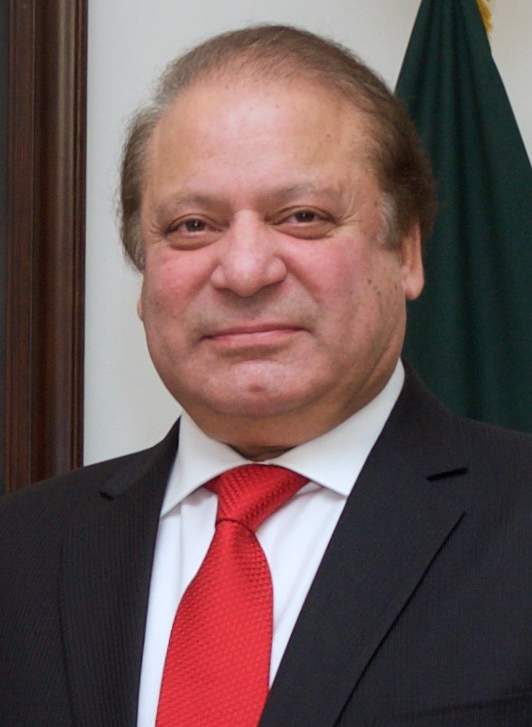|
Sar Zamin Khan
Sar Zamin Khan (; born 3 April 1981) is a Pakistani politician who had been a member of the National Assembly of Pakistan, from June 2013 to May 2018. Early life He was born on 3 April 1981. Political career Khan was elected to the National Assembly of Pakistan as an independent candidate from Constituency NA-23 (Kohistan) in the 2013 Pakistani general election. He received 17498 votes and defeated a candidate of Jamiat Ulema-e Islam (F). He later joined Pakistan Muslim League (N) The Pakistan Muslim League (N) or (PML(N)) is a Centre-right politics, centre-right, Conservatism in Pakistan, conservative political party in Pakistan. It is currently the third-largest party in the Senate of Pakistan, Senate and the larges .... During his tenure as Member of the National Assembly, he served as the Federal Parliamentary Secretary for Textile Industry. In October 2017, he was made Federal Parliamentary Secretary for Statistics. References Living people Pakistan Muslim ... [...More Info...] [...Related Items...] OR: [Wikipedia] [Google] [Baidu] |
National Assembly Of Pakistan
The National Assembly of Pakistan, also referred to as ''Aiwān-ē-Zairīñ'', is the lower house of the bicameralism, bicameral Parliament of Pakistan, with the upper house being the Senate of Pakistan, Senate. As of 2023, the National Assembly has a maximum membership of 336, of which 266 are directly elected by an adult universal suffrage and a First-past-the-post voting, first-past-the-post system to represent their respective List of constituencies of Pakistan, constituencies, while 60 are elected on reserved seats for women and religious minorities from all over the country. Members hold their seats for five years or until the house is dissolved by the President of Pakistan, President on the advice of the Prime Minister of Pakistan, Prime Minister. The house convenes at the Parliament House, Islamabad, Parliament House, Red Zone (Islamabad), Red Zone, Islamabad. Members are elected through the first-past-the-post system under universal adult suffrage, representing electo ... [...More Info...] [...Related Items...] OR: [Wikipedia] [Google] [Baidu] |
Constituency NA-23
NA-12 Upper Kohistan-cum-Lower Kohistan-cum-Kolai Palas Kohistan () is a constituency for the National Assembly of Pakistan. It covers the whole of districts of Kohistan Kohistan (, , ), also transliterated Kuhistan, Kuhiston, Quhistan, may refer to: In Afghanistan *Kohistan District, Kapisa, Kapisa Province ** Kohistan Hesa Awal District, a district in Kapisa Province, created within the former Kohistan Distr ..., Lower Kohistan, and Kolai-Palas. The constituency was formerly known as NA-23 (Kohistan) from 1977 to 2018. The name changed to NA-11 (Kohistan) after the delimitation in 2018 and to NA-12 (Kohistan-cum-Lower Kohistan-cum-Kolai Palas Kohistan) after the delimitation in 2022. Members of Parliament 1977–2002: NA-23 Kohistan 2002–2018: NA-23 Kohistan 2018–2023: NA-11 Kohistan-cum-Lower Kohistan-cum-Kolai Palas Kohistan 2024–present: NA-12 Kohistan-cum-Lower Kohistan-cum-Kolai Palas Kohistan Elections since 2002 2002 general election ... [...More Info...] [...Related Items...] OR: [Wikipedia] [Google] [Baidu] |
Pakistan Muslim League (N)
The Pakistan Muslim League (N) or (PML(N)) is a Centre-right politics, centre-right, Conservatism in Pakistan, conservative political party in Pakistan. It is currently the third-largest party in the Senate of Pakistan, Senate and the largest in the National Assembly of Pakistan, National Assembly. The party was founded in 1993, when a number of prominent Conservatism in Pakistan, conservative politicians in the country joined hands after the dissolution of Islami Jamhoori Ittehad, Islamic Democratic Alliance, under the leadership of former Prime Minister of Pakistan, Prime Minister Nawaz Sharif. The Party platform, party's platform is generally Conservatism in Pakistan, conservative, which involves supporting free markets, deregulation, Tax cut, lower taxes and Privatization, private ownership. Although the party initially supported social conservatism, in recent years, the party's political ideology and platform has become more Liberal conservatism, liberally conservative. A ... [...More Info...] [...Related Items...] OR: [Wikipedia] [Google] [Baidu] |
2013 Pakistani General Election
General elections were held in Pakistan on Saturday 11 May 2013 to elect the members of the List of members of the 14th National Assembly of Pakistan, 14th National Assembly of Pakistan, National Assembly and the four Subdivisions of Pakistan, Provincial Assemblies. The three major parties were the Pakistan Muslim League (N) (PML-N) led by Nawaz Sharif, the Pakistan People's Party (PPP) led by President of Pakistan, President Asif Ali Zardari and the Pakistan Tehreek-e-Insaf (PTI) led by Imran Khan. Prior to the elections, the ruling PPP formed an alliance with the Pakistan Muslim League (Q) and Awami National Party, while the main opposition party, the PML-N allied with the Pakistan Muslim League (F) and Baloch parties. The PTI led by cricketer-turned-politician Imran Khan, also emerged as a key-player. The result was a hung parliament, with the PML-N receiving the most votes and winning the most seats, but falling six seats short of a majority. However, following the elections, ... [...More Info...] [...Related Items...] OR: [Wikipedia] [Google] [Baidu] |
Jamiat Ulema-e Islam (F)
Jamiat Ulema-e-Islam Pakistan also known the Jamiat Ulema-e-Islam or simply as Jamiat Ulema-e-Islam (F) (; ; JUI (F)) is an Islamic fundamentalist political party in Pakistan. Established as the ''Jamiat Ulema-e-Islam'' in 1945, it is the result of a factional split in 1988, F standing for the name of its leader, Fazal-ur-Rehman. It has been called "the biggest religio-political party" in Pakistan, with the largest "proven street power." At the time of its inception it was based in southern Khyber Pakhtunkhwa which are mostly inhabited by Pashtuns, but over the years it has cemented its electoral base into Balouchistan, and into Sindh. The JUI (F) is the largest splinter group of the original JUI, which split into two factions in 1980 over the policy of Pakistani president Zia-ul-Haq of supporting Mujahideen outfits in the Afghanistan war. The other faction, the much smaller JUI-S, led by Samiul Haq, is of regional significance in Khyber Pakhtunkhwa. Two other small ... [...More Info...] [...Related Items...] OR: [Wikipedia] [Google] [Baidu] |
Islamabad
Islamabad (; , ; ) is the capital city of Pakistan. It is the country's tenth-most populous city with a population of over 1.1 million and is federally administered by the Pakistani government as part of the Islamabad Capital Territory. Built as a planned city in the 1960s and established in 1967, it replaced Karachi as Pakistan's national capital. The Greek architect Constantinos Apostolou Doxiadis developed Islamabad's master plan, in which he divided it into eight zones; the city comprises administrative, diplomatic enclave, residential areas, educational and industrial sectors, commercial areas, as well as rural and green areas administered by the Islamabad Metropolitan Corporation with support from the Capital Development Authority. Islamabad is known for its parks and forests, including the Margalla Hills National Park and the Shakarparian. It is home to several landmarks, including the country's flagship Faisal Mosque, which is the world's sixth-largest mosq ... [...More Info...] [...Related Items...] OR: [Wikipedia] [Google] [Baidu] |
Living People
Purpose: Because living persons may suffer personal harm from inappropriate information, we should watch their articles carefully. By adding an article to this category, it marks them with a notice about sources whenever someone tries to edit them, to remind them of WP:BLP (biographies of living persons) policy that these articles must maintain a neutral point of view, maintain factual accuracy, and be properly sourced. Recent changes to these articles are listed on Special:RecentChangesLinked/Living people. Organization: This category should not be sub-categorized. Entries are generally sorted by family name In many societies, a surname, family name, or last name is the mostly hereditary portion of one's personal name that indicates one's family. It is typically combined with a given name to form the full name of a person, although several give .... Maintenance: Individuals of advanced age (over 90), for whom there has been no new documentation in the last ten ... [...More Info...] [...Related Items...] OR: [Wikipedia] [Google] [Baidu] |
Pakistan Muslim League (N) Politicians
The Pakistan Muslim League (; known as PML), is the name of several different Pakistani political parties that have dominated the centre-right platform in the country. The ''Muslim League'' (the original successor of the All-India Muslim League) was the party of Pakistan's founders. However, it faced multiple fractures soon after Pakistan gained independence in 1947. It vanished in the 1970s. Its revival began in the mid-1980s and today several parties in Pakistan are named Muslim League. History First phase (1962–1969) The first "Pakistan" Muslim League was founded by President Ayub Khan in 1962 as a successor to the original Muslim League. Just a short period after its foundation, the party broke into two factions: Convention Muslim League that supported the President and the new Constitution, and the Council Muslim League, that opposed the new Constitution, denouncing it as undemocratic that made the Presidency an autocratic position. Following President Ayub's resig ... [...More Info...] [...Related Items...] OR: [Wikipedia] [Google] [Baidu] |
Pashtun Politicians
Pashtuns (, , ; ;), also known as Pakhtuns, or Pathans, are an Iranic ethnic group primarily residing in southern and eastern Afghanistan and northwestern Pakistan. They were historically also referred to as Afghans until 1964 after the term's meaning had become a demonym for all citizens of Afghanistan regardless of their ethnic group. The Pashtuns speak the Pashto language, which belongs to the Eastern Iranian branch of the Iranian language family. Additionally, Dari serves as the second language of Pashtuns in Afghanistan, while those in Pakistan speak Urdu and English. In India, the majority of those of Pashtun descent have lost the ability to speak Pashto and instead speak Hindi and other regional languages. There are an estimated 350–400 Pashtun tribes and clans with a variety of origin theories. In 2021, Shahid Javed Burki estimated the total Pashtun population to be situated between 60 and 70 million, with 15 million in Afghanistan. Others who accept the 1 ... [...More Info...] [...Related Items...] OR: [Wikipedia] [Google] [Baidu] |
People From Kohistan District
The term "the people" refers to the public or common mass of people of a polity. As such it is a concept of human rights law, international law as well as constitutional law, particularly used for claims of popular sovereignty. In contrast, a people is any plurality of persons considered as a whole. Used in politics and law, the term "a people" refers to the collective or community of an ethnic group or nation. Concepts Legal Chapter One, Article One of the Charter of the United Nations states that "peoples" have the right to self-determination. Though the mere status as peoples and the right to self-determination, as for example in the case of Indigenous peoples (''peoples'', as in all groups of indigenous people, not merely all indigenous persons as in ''indigenous people''), does not automatically provide for independent sovereignty and therefore secession. Indeed, judge Ivor Jennings identified the inherent problems in the right of "peoples" to self-determination, as i ... [...More Info...] [...Related Items...] OR: [Wikipedia] [Google] [Baidu] |
Pakistani MNAs 2013–2018
Pakistanis (, ) are the citizens and nationals of the Islamic Republic of Pakistan. Pakistan is the fifth-most populous country, with a population of over 241.5 million, having the second-largest Muslim population as of 2023. As much as 85-90% of the population follows Sunni Islam. A majority of around 97% of Pakistanis are Muslims. The majority of Pakistanis natively speak languages belonging to the Indo-Iranic family ( Indo-Aryan and Iranic subfamilies). Located in South Asia, the country is also the source of a significantly large diaspora, most of whom reside in the Arab countries of the Persian Gulf, with an estimated population of 4.7 million. The second-largest Pakistani diaspora resides throughout both Northwestern Europe and Western Europe, where there are an estimated 2.4 million; over half of this figure resides in the United Kingdom (see British Pakistanis). Ethnic subgroups Ethnically, Indo-Aryan peoples comprise the majority of the population in the ... [...More Info...] [...Related Items...] OR: [Wikipedia] [Google] [Baidu] |

